Project Management Institute Agile Certified Practitioner (PMI-ACP)® Exam Prep Course FAQ
An Introduction to the (PMI-ACP)®
In the mid 1990’s, the Agile development process emerged as an alternative to traditional plan-driven project management methodologies. Plan-driven methodologies had worked well for small projects with a limited scope of work and few variables, but as the IT industry evolved, development projects grew increasingly more complex. Agile ascribes to the principles of lean development, which emphasizes efficiency in order to optimize the delivery of value to the end customer. The pillars of Agile processes are laid out the Agile Manifesto as follows:
- Individuals and interactions over processes and tools.
- Working software over comprehensive documentation.
- Customer collaboration over contract negotiation.
- Responding to change over following a plan.
More generally, Agile emphasizes flexibility, nimbleness and adaptability. It is also iterative as opposed to cyclical, delivering capabilities to customers incrementally and mitigating risk relating to project scope and schedule uncertainty. Agile is now increasingly embraced as the development process of choice for project managers. Gartner estimates that 80% of all software development projects will utilize Agile methods by the end of 2012. Accordingly, the PMI® is now offering a new Agile certification — the (PMI-ACP)®. If you’re a project manager with Agile experience, you will demonstrate your knowledge of how Agile is applied and practiced. This certification is designed to verify project managers’ mastery of Agile principals and processes, validating their existing expertise to companies looking to adopt the Agile methodology.
How is the (PMI-ACP)® different from other Agile/Scrum certifications?
If you are new to Agile, cPrime recommends first taking our Certified Scrum Master Course. For project managers in the IT industry, learning the fundamentals, terminology, practices and principles of the roles of the Scrum Master or Scrum Team Member is a great introduction to the larger Agile framework. Additionally, there is no experience prerequisite for the Certified Scrum Master exam, which consists of 25 questions and is administered on a “no fail” basis. By contrast, the (PMI-ACP)® is specifically designed for Project & Program Managers, Product Owners, Scrummasters, Scrum Product Owners, Agile Coaches, Agile Trainers, Sr. Developers, Business and IT Managers with extensive experience in multiple Agile methodologies (Scrum, kanban, XP, lean, DSDM, TDD, ATDD, etc.). General project experience is required in addition to Agile-specific experience and education. The exam is designed to test both the practitioner’s level of professionalism in Agile practices of project management and professional versatility in project management tools and techniques. Prerequisite requirements for the pass/fail exam are broken down into three categories:
What are the (PMI-ACP)® Requirements?
To see if your project management experience satisfies the eligibility requirements, first download and review the (PMI-ACP)® Handbook. You can also Register for free, which you’ll need to do eventually to apply to take the exam. The site a great tool, with lots of additional resources and information on other PM certifications. Pages 7-8 of the PMI ACP Handbook provide a detailed explanation of the specific education, experience, and project management study prerequisites that must be met to qualify for the exam.
1. Project Management Experience
- Minimum of 2000 hours of general project experience.
- Minimum of 12 months of project management experience (gaps in experience and overlapping experience will not be counted). Each month in which you worked on multiple, overlapping projects (projects that ran simultaneously) counts as one month toward the total requirement.
- All applicable experience must not date back further than five years from the application submittal date.
2. Agile Project Experience
- Minimum of 1500 hours of Agile project experience.
- Minimum of 8 months of Agile project experience (gaps in experience and overlapping experience will not be counted). Each month in which you worked on multiple, overlapping projects (projects that ran simultaneously) counts as one month toward the total requirement.
- Agile project experience not dating back further than three years from application submittal date.
3. Training in Agile Practices
- Minimum of 21 contact hours of formal education (Professional Development Units) in Agile project philosophy, methodologies, principles and practices (one contact hour is equivalent to one actual hour of training or instruction received).
- There is no timeframe associated with this requirement; therefore, candidates can document all Agile project management education, regardless of when it was accrued. Coursework must be complete at the time of examination.
- Courses, workshops and training sessions offered by one or more of the following types of education providers:
A. PMI® Registered Education Providers(R.E.P.s)*
B. PMI® component organizations*
C. Employer/company-sponsored programs
D. Training companies or consultants (e.g., training schools)
E. Distance-learning companies, including an end-of-course assessment
F. University/college academic and continuing education programs
- Self-directed learning (e.g., reading books, watching instructional videos or sessions with coaches or mentors) does not qualify.
The exam is comprised of a total of 120 multiple-choice questions — 20 of which are pretest questions that do not affect the score. Computer-based testing is the standard method for PMI® certification exams, although paper-based testing is available in certain situations. The time allotted for the exam is three hours. Exam questions are divided evenly — 50% Agile tools and techniques and 50% knowledge and skills. The Agile tools and techniques covered include: Communications; Planning, monitoring and adapting; Agile estimation; Agile analysis and design; Product quality; Soft skill negotiation; Value-based prioritization; Risk management; Metrics; and Value stream analysis. The knowledge and skills portion of the exam is further divided into “Planning Levels”:
| Level 1 (33% of total questions) | Level 2 (12% of total questions) | Level 3 (5% of total questions) |
| Active listening | Agile frameworks and terminology | Agile contracting methods |
| Agile Manifesto values and principles | Building high-performance teams | Agile project accounting principles |
| Assessing and incorporating community and stakeholder values | Business case development | Applying new Agile practices |
| Brainstorming techniques | Colocation (geographic proximity)/distributed teams | Compliance (organization) |
| Building empowered teams | Continuous improvement processes | Control limits for Agile projects |
| Coaching and mentoring within teams | Elements of a project charter for an Agile project | Failure modes and alternatives |
| Communications management | Facilitation methods | Globalization, culture, and team diversity Agile games |
| Feedback techniques for product (e.g., prototyping, simulation, demonstrations, evaluations) | Participatory decision models (e.g., input-based, shared collaboration, command) | Principles of systems thinking (e.g., complex adaptive, chaos) |
| Incremental delivery | PMI’s Code of Ethics and Professional Conduct | Regulatory compliance |
| Knowledge sharing | Process analysis techniques | Variance and trend analysis |
| Leadership tools & techniques | Self assessment | Variations in Agile methods and approaches |
| Prioritization | Value-based analysis | Vendor management |
| Problem-solving strategies, tools, and techniques | ||
| Project and quality standards for Agile projects | ||
| Stakeholder management | ||
| Time, budget, and cost estimation | ||
| Value-based decomposition and prioritization |
cPrime’s Exam Prep
cPrime’s PMI® Agile Certification Exam Prep class utilizes an interactive format to prepare project managers for the exam. The curriculum for this course — the first of its kind in the world — covers the practical side of Scrum management with hands-on exercises, a glossary and a mock exam, along with topical content. Taught by Kevin Thompson, cPrime’s Agile lead and certified himself, the class is broken out by “planning levels” to provide a logical progression of the material covered. Taking the course also ensures that you have the required 35 Professional Development Units (PDUs)/ Contact hours. Classes are currently available in San Francisco, Los Angeles, Phoenix, Austin, Washington D.C., consult a current schedule for availability in your area — registering is easy.
How to Register for the (PMI-ACP)® Exam
Once you’ve satisfied all the requirements, you’re ready to sign up for the exam. Complete the application on the PMI® website. You have 90 days to complete the application once you have begun.
1. Register at PMI.org and log in to get started.
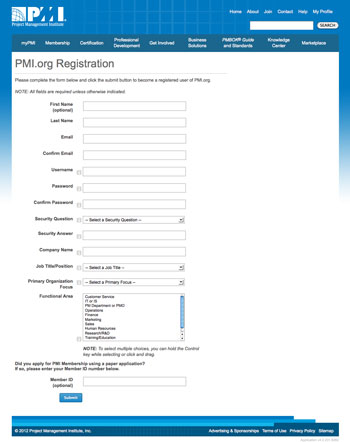
2. Go to https://certification.pmi.org/ and select “Apply for PMI-ACP Certification” from the list of certifications (you may be asked to log in again). You can also download the printable PMI-ACP application form.
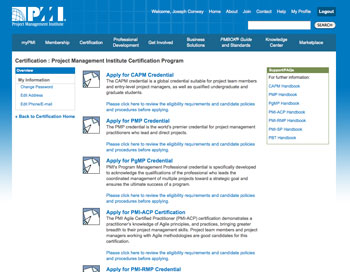
3. Enter a current address, either home or work.
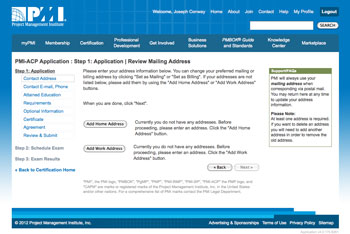
4. Confirm or add your email and phone.
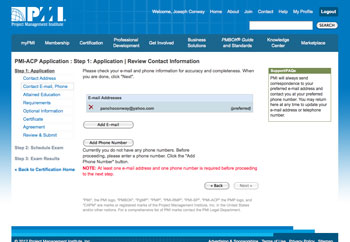
5. Enter your educational background information.
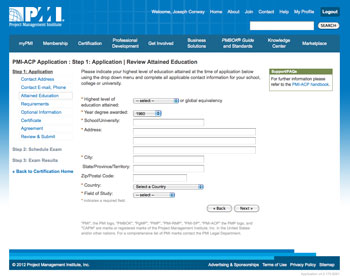
6. Read the Registration Requirements to verify your eligibility.
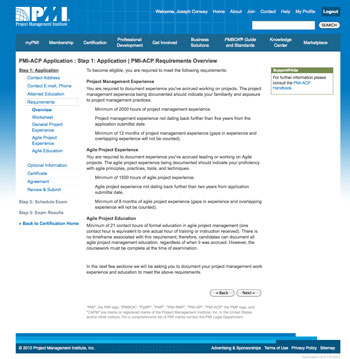
7. The next page is the Eligibility Worksheet. Click the link to update your Project Management Work Experience.
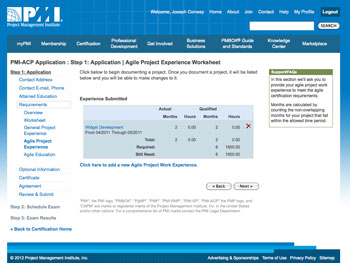
8. Then click on the “Add General Experience” button. Enter any and all applicable project experience, including company information when prompted.
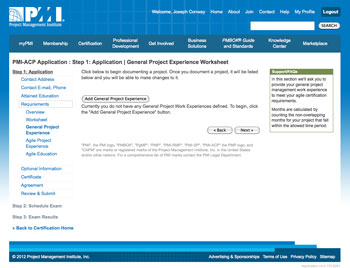
9. Do the same for “Agile Project Experience” (A) and “Agile Education” (B). Reference page 8 of the PMI-ACP Handbook for the requirement specifics in detail.
A
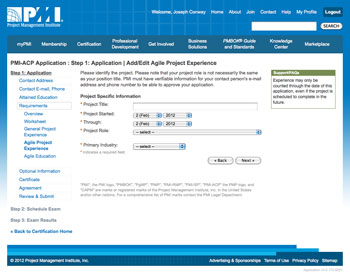
B
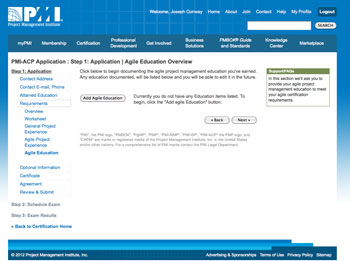
10. Fill out any of the Optional Information.
11. Enter your name as you would like it to appear on your certificate.
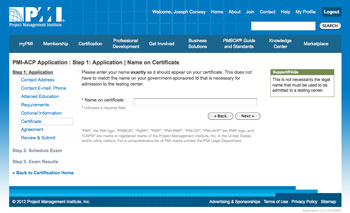
12. Read the Application/Renewal Agreement and click “I Agree.”
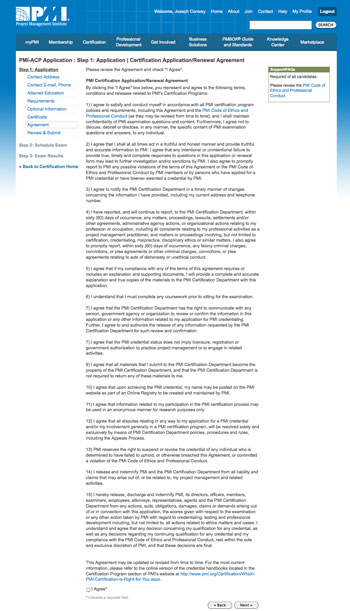
13. At this point you will be asked to review your application. Any requirements that have not been met or recorded will be listed as incomplete. You can always log in to the PMI website later to update your application. Simply select “MyPMI” from the navigation bar, click on “Continue working on your application” on the right side of the screen, and choose “Continue working on PMI-ACP application.”
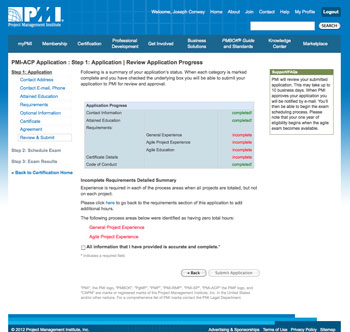
14. When you have completed all of the requirements and entered the appropriate information, confirm that all of the information you have provided is accurate and complete by checking the box at the bottom of the page. Then you can submit your application to the PMI for approval, along with payment.
| Exam Administration Type | PMI Member Status | US Dollars |
| Computer-based testing (CBT) | Member | $435 |
| Computer-based testing (CBT) | Nonmember | $495 |
| Paper-based testing (PBT) | Member | $385 |
| Paper-based testing (PBT) | Nonmember | $445 |
15. Once you have submitted your application, you’ll be able to schedule your exam and eventually see your exam results within this same portal.
(PMI-ACP)®, PMBOK® Guide and PMI® are registered marks of the Project Management Institute, Inc.